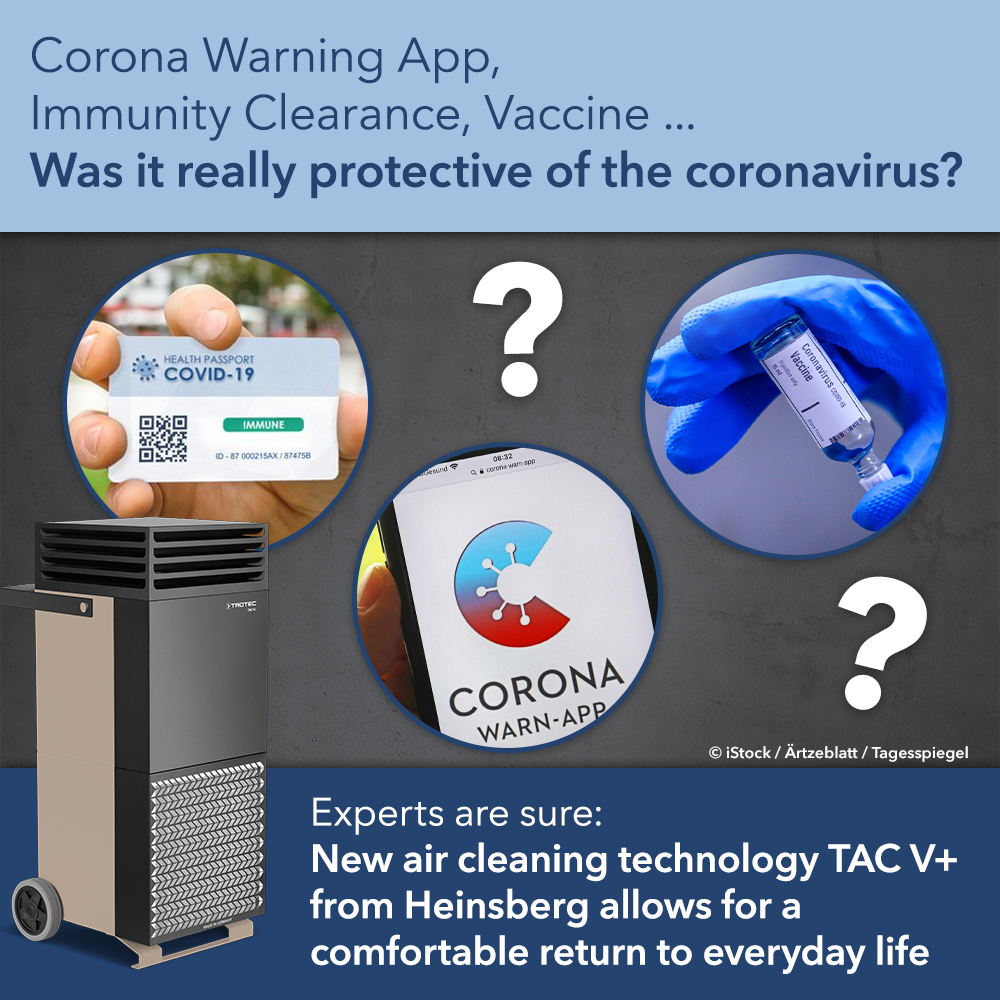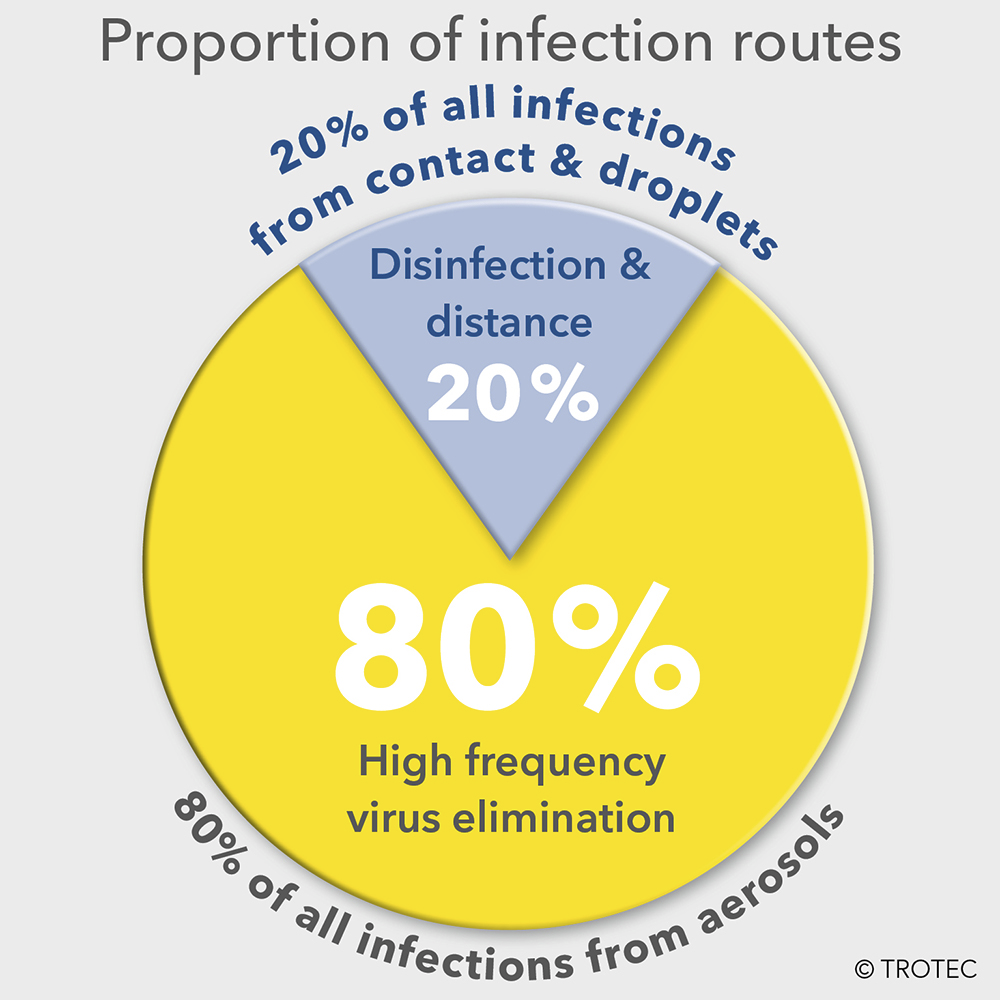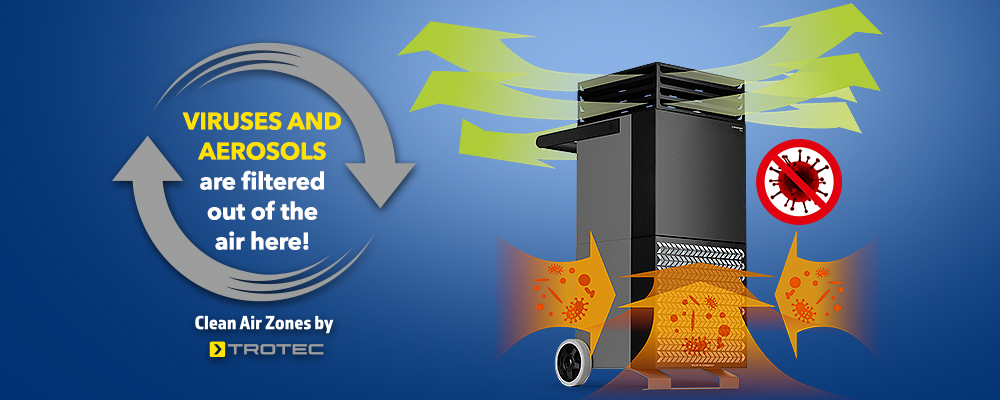 Experts are certain of the following: TAC V+ novel air purifying technology from Heinsberg enables an immediate return to everyday life
Experts are certain of the following: TAC V+ novel air purifying technology from Heinsberg enables an immediate return to everyday life
The battle against coronavirus is being fought on various fronts. For a long time, mouth and nose protectors and social distancing rules were considered the measure of all things to protect against infection with the coronavirus, but the tide has turned in recent weeks. With the current findings suggesting that the virus is mainly transmitted through the air, hopes are now pinned on the rapid development of a suitable vaccine. But while the search for this vaccine is still in full swing, initial studies are already feeding doubts about its effectiveness.
The study proves the following: immunity passports and vaccines do not provide sustained protection against the virus
A study published on Medrxiov (document server for scientific publications) by Chinese and American scientists calls into question whether people develop long-lasting immunity after becoming infected with Covid-19. Because not all those infected by the virus develop antibodies. In addition, the blood of some of the test subjects did not contain any antibodies for Sars-CoV-2, even though a large proportion of those tested had become infected with the virus. This led the scientists to conclude that patients who had no antibodies 21 days after the onset of symptoms “most likely lost the IgG antibodies when they recovered from the infection”.
Having the coronavirus once does not protect against re-infection
With this knowledge, the immunity passport proposed by some EU ministries would be useless and even a vaccine would not guarantee long-lasting immunity. The concept of herd immunity, frequently brought into play by epidemiologists, would also be off the table, because the one-off detection of antibodies would still not protect against reinfection.
Corona-Warn-App: Receiving information following contact with infected individuals does not protect against infection
A corona warning app that is already being used in several countries turns mobile phones into warning systems. Nevertheless, the app does not protect against infection with the coronavirus. It merely informs the user “afterwards” if he or she has had contact with a person who is proven to have been infected – provided that they also use the app.
As varied as the approaches to contain the corona pandemic may be, the only real way of protecting yourself from infection at the moment is by “literally” avoiding the virus (social distancing) and avoiding public areas with many people. Or, metaphorically speaking, by getting the virus “out of the way” and thus preventing it from entering the body via the airways. All scientists and virologists now agree on this. The danger is in the air.
80 percent of all corona infections occur via the air
While at the beginning of the corona pandemic it was assumed that the virus was mainly transmitted via droplet and smear infection, the air we breathe is now considered to be the main transmission path of the virus. In an interview with the German daily newspaper Rheinische Post, Dr. Thomas Voshaar (medical advisor to the German Federal Minister of Health, Jens Spahn) clarifies that about 80 % of corona infections occur via indoor air.

More precisely through so-called aerosols, a mixture comprising gas (usually air) and solid or liquid constituents, which contain viruses in infected persons. These tiny floating particles are mainly released into the air when breathing and speaking. While the large droplets sink to the ground after only about 1.5 meters due to their weight (which informs the social distancing rule of 1.5 meters), aerosol particles can float in the air for several hours owing to their small size (about 0.3 – 0.4 µm). The situation is further aggravated by the fact that even more aerosol particles are produced in the lungs of infected persons and released via respiration.
Aerosol particles are considered to pose the greatest infection risk
A critical factor in the risk of infection with the coronavirus is how long the virus-laden aerosols remain in the room air. This is because unlike outdoor air, where aerosol mixtures are diluted and blown away by the movement of clean fresh air, the aerosol concentration in closed rooms remains continuously high. The more aerosols are suspended in the air – and the longer they remain so – the faster these enter the body via the respiratory tract to cause an infection in the lungs. Even in only one cubic centimetre of air about 50,000 particles such as dust, pollen as well as bacteria and viruses can be found. And with each additional person in the room, the aerosol concentration in the room increases by thousands of particles per minute.
Air purifiers eliminate infectious aerosols from the indoor air
There are currently only two effective ways to remove infectious aerosol particles from the room air. One way is by permanently ventilating rooms through keeping windows and doors open. However, this approach really only works in theory, since, for example, traffic noise or seasonal temperatures make it impossible to keep windows open on a permanent basis. The second option is to use a suitable air purifier such as the TAC V+ high-frequency air purifier from Trotec, which immediately dilutes the aerosol mixtures in the room air and then uses a special HEPA virus filer to filter out and inactivate them. This HEPA room air filter technology has been used in hospitals for a while now – to keep operating theatres germ-free, for example.
The TAC V+ mobile air purifier generates the same air quality as in operating theatres
With the TAC V+ air purifier, Trotec has developed the world’s first mobile high-frequency air purifier with HEPA filter technology, making the high medical protection level of filter class 14 affordable for private users and companies as well. According to Voshaar, simple air conditioning units offer no protection, as they are usually only equipped with simple dirt filters. Only with HEPA special filters to filter infectious aerosols from the rooms can the air in closed rooms be reliably kept clean.
“Initial investigations are underway. And it seems that special filters can filter the aerosols from the rooms. The first tests will soon be carried out in hospitals to determine whether the air in a room in which an infected person is present can be kept clean of aerosols using this type of filter. And this could then also be used in offices, so that more people can work there safely again,” says Voshaar in the interview. And what protects staff in hospitals and employees in companies also helps all other areas of public life to return to normal operation safely.

The air filtration concept behind the first TAC V+ air purifier successfully tested in clinical trials is based on two pillars:
- On the one hand, the aerosol concentration in the room air is continuously and effectively diluted with virus-filtered HEPA ultrapure air. To this end, the purifier has a high ultrapure air capacity – previously unattained with mobile devices – which enables an air exchange rate up to 20 times per hour.
- In addition, airborne viruses and bacteria are first separated in an innovative, heat-resistant HEPA particulate filter and then killed off cyclically by thermal decontamination. This special filter of protection class 14 exclusively developed by Trotec is distinguished by a separation efficiency of 99.995 percent for particle sizes from 0.1 to 0.2 µm. Thanks to these features, H14 high-performance filters are even used to produce clean air in operating theatres and in similar hygiene-sensitive areas.
Simply put, the air purifier brings the outdoor air condition indoors, and complements this with highly efficient virus filtering and inactivation.
What sounds very technical in theory proves to be really simple in practice. The draught-free intake of polluted room air occurs close to the floor, the ultrapure air free of viruses then being returned vertically upwards into the room. Thanks to the mobile design enabling several TAC V+ air purifiers to be used, even large areas of ultrapure air without hazardous aerosol contamination can be realised.
The TAC V+ mobile air purifier is available in several colours and equipment variants in the Trotec shop, as well as in any of the Trotec branches across Europe.
Special conditions apply to schools, public institutions and hospitals when purchasing or renting the device. Feel free to talk to us personally:
Trotec GmbH, Herr Jochem Weingartz
+49 2452 962-137, jochem.weingartz@trotec.com

Trotec STORE


